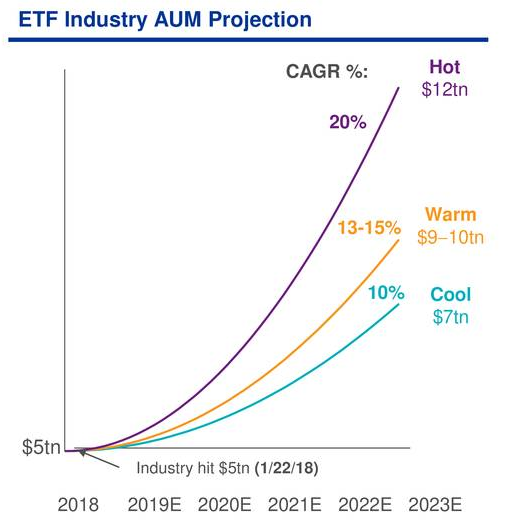Is Trump's Anxiety Over China's Greenland Influence Valid?

Table of Contents
China's Strategic Interests in Greenland
China's growing interest in Greenland stems from a confluence of economic, geopolitical, and scientific ambitions.
Economic Opportunities
Greenland possesses significant untapped resources, making it an attractive target for Chinese investment. The island holds vast reserves of rare earth minerals, crucial for modern technology and a sector where China currently dominates. Furthermore, Greenland's strategic location opens avenues for significant infrastructure development, potentially boosting China's global trade networks.
- Specific Chinese Investments: While not always publicly disclosed, Chinese companies have shown interest in Greenlandic mining projects, particularly those involving rare earth minerals. This includes potential investments in infrastructure projects such as ports and airports, vital for resource extraction and transportation.
- Impact on Greenland's Economy: These investments offer Greenland the potential for significant economic growth and diversification, lessening its dependence on Denmark. However, concerns remain regarding potential debt traps and environmental consequences.
- Belt and Road Initiative (BRI): The expansion of the BRI into the Arctic, including Greenland, would provide China with enhanced access to crucial shipping routes and resource-rich territories. This presents both opportunities and challenges for Greenland, as well as potential concerns for other Arctic nations. Keywords: China Greenland investment, rare earth minerals Greenland, Belt and Road Initiative Arctic.
Geopolitical Positioning
Greenland's strategic location in the Arctic makes it a crucial geopolitical asset. Its proximity to major shipping routes, including the Northwest Passage, offers significant advantages for maritime trade and resource access. For China, gaining a foothold in Greenland aligns with its broader ambition to become a leading power in the Arctic region.
- China's Arctic Strategy: China's Arctic policy emphasizes its status as a "near-Arctic state," actively seeking to participate in Arctic governance and resource development. Greenland's cooperation is vital in achieving this ambition.
- Greenland's Geopolitical Significance: Greenland's location provides access to key shipping lanes and vast natural resources, enhancing its strategic importance for global power dynamics.
- Military Implications: Although currently absent, the potential for a future Chinese military presence in Greenland raises serious concerns for the United States and its allies, impacting regional security and balance of power. Keywords: China Arctic strategy, Greenland geopolitics, Arctic shipping routes.
Scientific Research and Environmental Concerns
China is increasingly involved in scientific research in the Arctic, including climate change research in Greenland. This engagement offers potential benefits in understanding the impacts of global warming, but also raises questions about data access and potential environmental risks.
- Arctic Climate Change Research: China's increased research activity provides valuable data on the effects of climate change on the Arctic ecosystem, but concerns exist about the transparency and potential misuse of this data.
- Greenland Environmental Impact: The influx of Chinese investments and activities carries the risk of environmental damage unless stringent environmental protection measures are implemented and enforced.
- International Collaboration: Cooperation on environmental protection is essential to mitigate the risks associated with increased activity in the Arctic. Keywords: Arctic climate change, Greenland environmental impact, China Arctic research.
The United States' Concerns and Countermeasures
The Trump administration voiced strong concerns about China's growing influence in Greenland, viewing it as a threat to US national security and economic interests.
Trump Administration's Response
Trump's attempts to purchase Greenland from Denmark were widely seen as a dramatic response to perceived Chinese encroachment. This action, while ultimately unsuccessful, highlighted the US government's anxieties about China's expanding influence in the Arctic.
- Trump's Statements and Actions: Trump's public statements and the attempted purchase of Greenland underscored the perceived threat posed by increased Chinese engagement in the region.
- Motivations: The US concerns stemmed from both strategic considerations (limiting China's geopolitical reach) and economic competition (protecting access to resources and trade routes). Keywords: Trump Greenland policy, US China competition Greenland.
Subsequent US Actions and Strategies
The Biden administration has maintained a focus on countering Chinese influence in the Arctic while also emphasizing multilateral cooperation.
- Biden Administration's Approach: The Biden administration's strategy involves strengthening alliances with Arctic nations and engaging in diplomatic efforts to balance China's influence.
- Increased US Engagement: The US has increased its diplomatic presence and engagement in Arctic affairs, participating in international forums and strengthening partnerships with other Arctic nations.
- Arctic Cooperation: Increased collaboration with Arctic nations helps to counterbalance China's growing presence and promote stability in the region. Keywords: Biden Greenland policy, US Arctic strategy, Arctic cooperation.
Greenland's Perspective and Autonomy
Greenland faces the challenge of balancing its need for economic development with its geopolitical sensitivities.
Balancing Competing Interests
Greenland seeks to leverage its resources and strategic location for economic advancement while managing its relationship with both the US and China.
- Greenland's Economic Development: Greenland's primary focus remains on economic development to improve living standards and reduce dependence on Denmark.
- Navigating Geopolitical Pressures: Greenland's autonomy allows it to engage with multiple international partners, although it must carefully manage its relations with both major powers. Keywords: Greenland sovereignty, Greenland economic development, Greenland China relations.
Conclusion
The question of whether Trump's anxiety over China's influence in Greenland was valid remains complex. China's economic and geopolitical objectives in the Arctic are clear, posing challenges to the United States and its allies. Greenland's strategic importance and its delicate balancing act between major powers highlight the complexities of the Arctic geopolitical landscape. While Trump's actions were dramatic, the underlying concerns regarding China's growing influence in Greenland and the broader Arctic region remain significant. Further research and understanding of the evolving geopolitical landscape in the Arctic, particularly concerning China's role in Greenland, are crucial. Continue exploring the nuances of China's influence in Greenland and the implications for global security and economic competition. Stay informed on the ongoing developments in this critical Arctic region.

Featured Posts
-
 Investigation Into Antisemitic Acts At Boeing Seattle
May 08, 2025
Investigation Into Antisemitic Acts At Boeing Seattle
May 08, 2025 -
 Section 230 And Banned Chemicals A Judges Ruling On E Bay Listings
May 08, 2025
Section 230 And Banned Chemicals A Judges Ruling On E Bay Listings
May 08, 2025 -
 Istoriya Matchiv Ps Zh Ta Aston Villi V Yevrokubkakh
May 08, 2025
Istoriya Matchiv Ps Zh Ta Aston Villi V Yevrokubkakh
May 08, 2025 -
 Wall Streets Bullish Prediction This Black Rock Etf Could Surge 110 In 2025
May 08, 2025
Wall Streets Bullish Prediction This Black Rock Etf Could Surge 110 In 2025
May 08, 2025 -
 Rezultaty Vsekh Matchey Arsenal Ps Zh V Evrokubkakh
May 08, 2025
Rezultaty Vsekh Matchey Arsenal Ps Zh V Evrokubkakh
May 08, 2025
Latest Posts
-
 Black Rock Etf Billionaire Investments Fuel 110 Growth Prediction For 2025
May 08, 2025
Black Rock Etf Billionaire Investments Fuel 110 Growth Prediction For 2025
May 08, 2025 -
 110 Gain Potential Why Billionaires Are Investing In This Black Rock Etf
May 08, 2025
110 Gain Potential Why Billionaires Are Investing In This Black Rock Etf
May 08, 2025 -
 110 Growth Potential Why Billionaires Are Investing In This Black Rock Etf
May 08, 2025
110 Growth Potential Why Billionaires Are Investing In This Black Rock Etf
May 08, 2025 -
 Wall Streets Next Big Thing Billionaire Backed Etf Poised For 110 Growth
May 08, 2025
Wall Streets Next Big Thing Billionaire Backed Etf Poised For 110 Growth
May 08, 2025 -
 Wall Streets Bullish Prediction This Black Rock Etf Could Surge 110 In 2025
May 08, 2025
Wall Streets Bullish Prediction This Black Rock Etf Could Surge 110 In 2025
May 08, 2025
